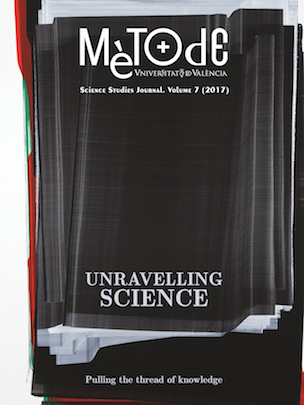Space, time, and irreversibility: The philosophical problems of contemporary astrophysics
DOI:
https://doi.org/10.7203/metode.7.8478Keywords:
ontology, space-time, epistemology, black holes, gravitational waves Abstract
Abstract
Scientific philosophy is that which is informed by science. It uses exact tools such as logic and mathematics and provides a framework for scientific activity to solve more general questions about nature, the language we use to describe it, and the knowledge we obtain thanks to it. Many of the scientific philosophy theories can be proven and evaluated using scientific evidence. In this paper, I focus on showing how several classical philosophy topics, such as the nature of space and time or the dimensionality of the future, can be addressed philosophically using the tools from current astrophysics research and, in particular, from the study of black holes and gravitational waves.
 Downloads
Downloads
 References
References
Boltzmann, L. (1974). Theoretical physics and philosophical problems: Selected writings. Dordrecht: Reidel.
Bunge, M. (1974-1989). Treatise on basic philosophy. Dordrecht: Kluwer.
Ferrater-Mora, J. (1994). Diccionario de filosofía. Barcelona: Ariel.
Novello, M., & Perez-Bergliaffa, S. E. (2008). Bouncing cosmologies. Physics Reports, 463(4), 127–213. doi: 10.1016/j.physrep.2008.04.006
Reichenbach, H. (1977). Der aufstieg der wissenschaftlichen philosophie. Wiesbaden: Wiever Verlagsgesellschaft.
Rescher, N. (2001). Nature and understanding: The metaphysics and methods of science. Oxford: Oxford University Press.
Romero, G. E. (2012). Parmenides reloaded. Foundations of Science, 17(3), 291–299. doi: 10.1007/s10699-011-9272-5
Romero, G. E. (2013a). From change to spacetime: An eleatic journey. Foundations of Science, 18(1), 139–148. doi: 10.1007/s10699-012-9297-4
Romero, G. E. (2013b). Adversus singularitates: The ontology of space–time singularities. Foundations of Science, 18(2), 297–306. doi: 10.1007/s10699-012-9309-4
Romero, G. E. (2015). Present time. Foundations of Science, 20(2), 135–145. doi: 10.1007/s10699-014-9356-0
Romero, G. E. (2017). On the ontology of spacetime: Substantivalism, relationism, eternalism, and emergence. Foundations of Science, 22(1), 141–159. doi: 10.1007/s10699-015-9476-1
Romero, G. E., & Pérez, D. (2011). Time and irreversibility in an accelerating universe. International Journal of Modern Physics D, 20(14), 2831–2838. doi: 10.1142/S021827181102055X
Romero, G. E., & Vila, G. S. (2014). Introduction to black hole astrophysics. Heidelberg: Springer.
Stolpovskiy, M. (2016, March, 19-26). QUBIC Experiment. Conference 51th Rencontres de Moriond, La Thuile, Italy. Retrieved from https://arxiv.org/pdf/1605.04869v1.pdf
Downloads
Published
How to Cite
-
Abstract1449
-
PDF611
Issue
Section
License
![]()
All the documents in the OJS platform are open access and property of their respective authors.
Authors publishing in the journal agree to the following terms:
- Authors keep the rights and guarantee Metode Science Studies Journal the right to be the first publication of the document, licensed under a Creative Commons Attribution-NonCommercial-NoDerivatives 4.0 International License that allows others to share the work with an acknowledgement of authorship and publication in the journal.
- Authors are allowed and encouraged to spread their work through electronic means using personal or institutional websites (institutional open archives, personal websites or professional and academic networks profiles) once the text has been published.





